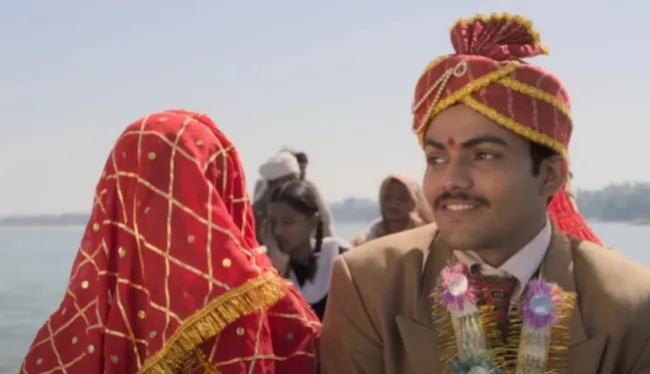On a momentous day that bridges the world of law and cinema, the Supreme Court of India witnessed an unprecedented event with the screening of the much-anticipated film “Laapataa Ladies,” This unique screening, attended by Chief Justice of India D.Y. Chandrachud and the iconic Bollywood actor Aamir Khan himself, marked a significant cultural event, highlighting the evolving relationship between art and the judiciary. The film, which has already garnered attention for its engaging narrative and powerful performances, was showcased within the premises of India’s highest court, underscoring the growing recognition of cinema as not just a medium of entertainment but also a potent tool for social commentary and reflection. “Laapataa Ladies” explores themes deeply rooted in the fabric of Indian society, addressing issues of gender, identity, and social norms through a compelling storyline. Set in a rural backdrop, the film navigates the lives of its female protagonists as they deal with the challenges of societal expectations and the quest for personal freedom. The narrative delves into the complexities of rural life in India, where the clash between tradition and modernity often creates intricate dilemmas, especially for women. By choosing to screen this film at the Supreme Court, the event draws attention to the role of the judiciary in safeguarding the rights and freedoms of individuals, particularly women, who continue to face systemic challenges in asserting their identities and choices. The presence of Chief Justice D.Y. Chandrachud at the screening is particularly significant. Known for his progressive judgments and advocacy for human rights, Justice Chandrachud’s attendance symbolizes the judiciary’s recognition of the importance of cultural narratives in shaping societal values. His participation in this event sends a powerful message about the judiciary’s openness to engaging with diverse forms of expression that contribute to the broader discourse on justice and equality. The screening also aligns with the Chief Justice’s ongoing efforts to make the judiciary more accessible and relatable to the common people, breaking down the barriers that often isolate legal institutions from the realities of everyday life. Aamir Khan, who is not only a celebrated actor but also a producer known for backing socially relevant films, has once again brought to the fore issues that resonate with the masses. His involvement in “Laapataa Ladies” is a continuation of his commitment to producing cinema that sparks conversation and promotes social change. Khan’s presence at the Supreme Court screening further amplifies the film’s impact, drawing attention from both the public and the legal fraternity. Over the years, Aamir Khan has been instrumental in using his platform to address critical social issues, whether through his films or television show “Satyamev Jayate,” which tackled various social ills and promoted awareness. The decision to hold the screening in the Supreme Court premises also reflects a broader trend where the judiciary is increasingly acknowledging the influence of art and culture in shaping public consciousness. Films, as a form of mass media, have the power to influence opinions, challenge norms, and inspire change. By hosting a film screening, the Supreme Court not only recognizes this power but also emphasizes the need for the legal system to remain connected with the cultural pulse of the nation. This event is a testament to the idea that justice is not just about laws and statutes but also about understanding the social contexts within which these laws operate.
Supreme Court of India witnessed an unprecedented event with the screening of the much-anticipated film “Laapataa Ladies,”
The collaboration between the film industry and the judiciary in this event is a rare yet meaningful convergence of two powerful entities that shape society in different ways. While the judiciary interprets and enforces the law, cinema reflects and often critiques the realities of life, including the legal and social systems. This screening is a reminder that the narratives presented in films can serve as a mirror to society, reflecting both its strengths and flaws. It also highlights the role of the judiciary in not just upholding the law but also in fostering a society that is informed, aware, and empathetic to the issues depicted in these narratives. As the film industry continues to evolve, with filmmakers increasingly exploring complex social issues, events like this screening at the Supreme Court could set a precedent for future collaborations. It opens up possibilities for the judiciary to engage more deeply with cultural discourses and for filmmakers to consider the legal and ethical implications of the stories they tell. This interaction between law and cinema can enrich both fields, offering new perspectives and fostering a more holistic understanding of the challenges faced by society. The screening of “Laapataa Ladies” at the Supreme Court is more than just a cultural event; it is a symbol of the potential for dialogue between different sectors of society. It suggests a future where the judiciary and the arts can collaborate to promote justice and social change in innovative ways. By bringing the narrative of “Laapataa Ladies” to the Supreme Court, the event underscores the importance of storytelling in the pursuit of justice, reminding us that the stories we tell and the laws we uphold are both integral to the fabric of our society. The screening of “Laapataa Ladies” at the Supreme Court, attended by Chief Justice D.Y. Chandrachud and Aamir Khan, represents a significant cultural milestone. It exemplifies the growing recognition of the role of cinema in social discourse and the judiciary’s openness to engaging with cultural narratives. This event not only highlights the power of film to address and reflect societal issues but also sets a precedent for future collaborations between the legal and cultural sectors. It is a reminder that justice and storytelling are intertwined, both crucial in shaping a society that values equality, freedom, and human rights.

